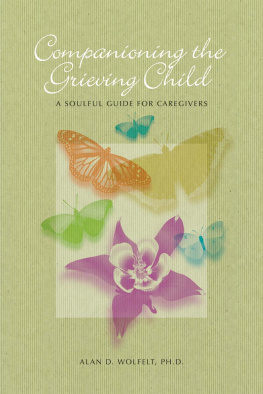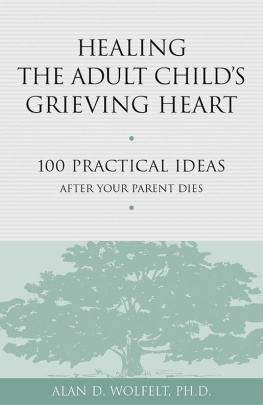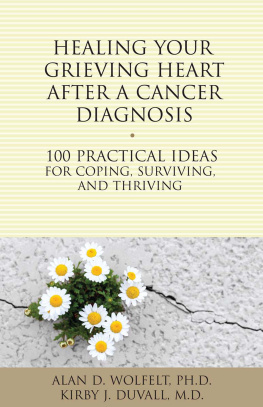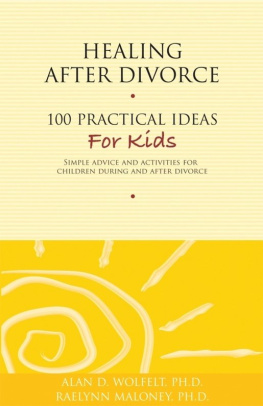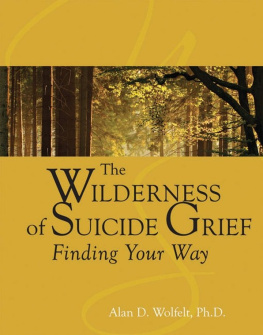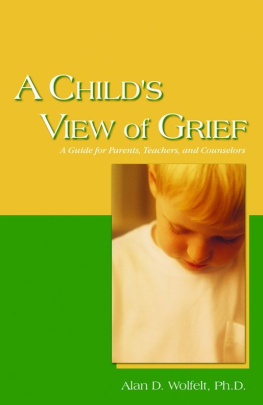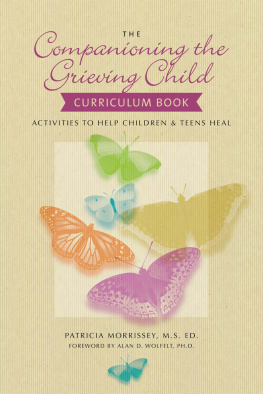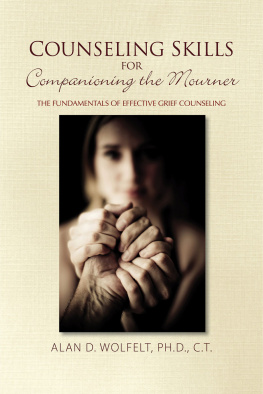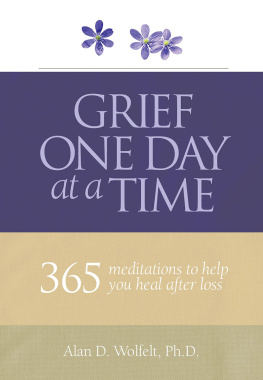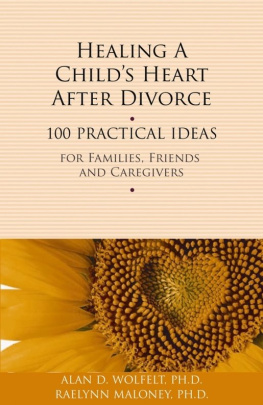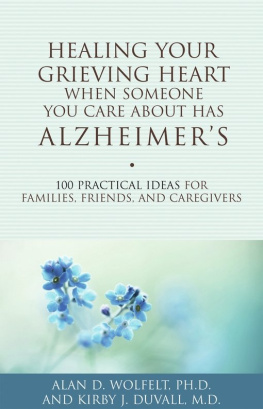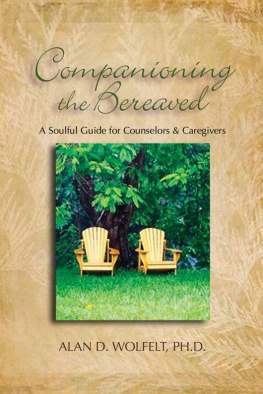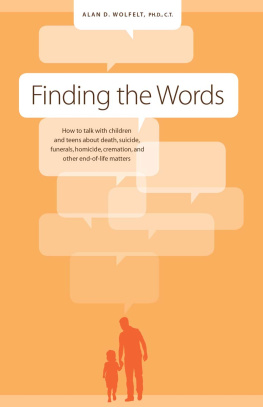
Also by Alan D. Wolfelt, Ph.D.
Companioning the Bereaved: A Soulful Guide for Caregivers
Companioning the Dying: A Soulful Guide for Caregivers
by Greg Yoder Foreword by Alan D. Wolfelt, Ph.D.
Companioning at a Time of Perinatal Loss: A Guide for Nurses, Physicians, Social Workers and Chaplains in the Hospital Setting
by Jane Heustis & Marcia Meyer Jenkins Foreword by Alan D. Wolfelt, Ph.D.
Understanding Your Grief: Ten Essential Touchstones for Finding Hope and Healing Your Heart
Loving from the Outside In, Mourning from the Inside Out
Eight Critical Questions for Mourners: And the Answers That Will Help You Heal
Healing Your Grieving Heart When Someone You Care About Has Alzheimers: 100 Practical Ideas for Families, Friends, and Caregivers
Companion Press is dedicated to the education and support of both the bereaved and bereavement caregivers. We believe that those who companion the bereaved by walking with them as they journey in grief have a wondrous opportunity: to help others embrace and grow through griefand to lead fuller, more deeply-lived lives themselves because of this important ministry.
For a complete catalog and ordering information, write or call or visit our website:

Companion Press
The Center for Loss and Life Transition
3735 Broken Bow Road
Fort Collins, CO 80526
(970) 226-6050 FAX 1-800-922-6051

2012 by Alan D. Wolfelt, Ph.D.
All rights reserved. No part of this publication may be reproduced, stored in a retrieval system, or transmitted in any form or by any means, electronic, mechanical, photocopying, recording or otherwise, without the prior permission of the publisher.
Companion Press is an imprint of the Center for Loss and Life Transition, 3735 Broken Bow Road, Fort Collins, Colorado 80526, (970) 226-6050, www.centerforloss.com.
Companion Press books may be purchased in bulk for sales promotions, premiums and fundraisers. Please contact the publisher at the above address for more information.
Printed in Canada.
18 17 16 15 14 13 12 5 4 3 2 1
ISBN 978-1-617221-58-3
To all of the children, teens, adults, and families who have allowed me the privilege of companioning them out of the dark and into the light. You have been my teachers and encouraged me to inspire others to bear witness to families experiencing grief, loss, and the resulting transformation of life, living, and loving. What an honor to be able to attempt to touch the lives of people throughout North America and the world. Thank you! Thank you! Thank you!

CONTENTS
Preface

Please take pause for a moment to reflect on your own childhood losses and your struggles to understand your experiences with these losses. As you do so, I hope you recognize the need for resources intended to help adults artfully companion children in the journey into grief and mourning.
It was in 1983 that I wrote the following: Any child old enough to love is old enough to grieve. Since that time Ive attempted to continue to learn from many grieving children and their families. Ive also had the privilege of teaching and learning from thousands of caregivers to bereaved children throughout North America. I have certainly changed and, I like to think, grown both as a caregiver and as a human being in these last twenty-nine years.
On a personal level this growth is largely attributable to the births of my three lovely children, Megan, Christopher, and Jaimie. They, along with the children and adolescents I have companioned as a counselor, are my constant teachers. I hope the following pages reflect some maturity and wisdom gained over nearly three decades as a counselor. As I grow older, my inner child keeps reminding me that I must stay in touch with that little boy inside myself. Every day, even as my children are growing into young adults, they often remind me that play and good self-care should always be a priority in the journey of life and living.

To companion grieving children means to be an active participant in their healing. When you as a caregiver companion grieving children, you allow yourself to learn from their unique experiences. You let them teach you instead of the other way around. You make the commitment to walk with them as they journey through grief.

Professionally, I am convinced that working with bereaved families, particularly children, is more art than science. I believe the current trend toward evidence-based research is inviting many caregivers to work with grieving families more from their heads than their hearts.
Each of us as caregivers to grieving kids must, in part, find our own way. We must combine our life experiences with knowledge, skill, and a creative, intuitive, flowing sense of joining the world of the hurting child. For me, counseling bereaved children is more of an intuitive, spiritual ; and the Tenets of Companioning the Bereaved on p. 12.)

Bereavement literally means to be torn apart and to have special needs.

When I created this book in 1996 and now this most recent revision in 2012, I told myself I didnt want to add another academic textbook to the library shelves of educators and clinicians. While I must admit that I occasionally find myself thinking I should fill these pages with a multitude of research-based references, I have resisted the urge. Im proud to be an academician-clinician and respect the need to draw on research in my work with bereaved children. However, I wanted this book to be about what I think and feel about companioning grieving children: what I do and how I do it. If this sounds interesting to you, please read on! If it doesnt, you may find other books more suited to your needs.
I have found that many people who work with grieving children are burdening themselves with thoughts that they should always know what to say and do. Many seem to want a cookbook, prescriptive approach to treating the child. I have found that the need to fill silences and treat bereaved children as patients results from contamination by a medical model of mental health caregiving. This model teaches us to study a body of knowledge, assess patients, and treat them with hopes of resolving issues and conflicts. In my experience, there is one major problem with this model as it applies to caring for grieving childrenit doesnt work!
Next page
